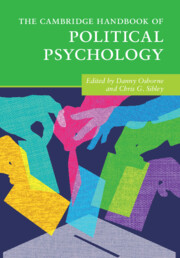Book contents
- The Cambridge Handbook of Political Psychology
- The Cambridge Handbook of Political Psychology
- Copyright page
- Dedication
- Contents
- Figures
- Tables
- Contributors
- Part I Foundations of Political Psychology
- Part II The Politics of Intergroup Attitudes
- Part III Contemporary Challenges to Democracy
- Part IV Diversifying Perspectives in Political Psychology
- 37 Political Psychology in the Global South
- 38 Political Psychology in the Arab Region
- 39 Critical Perspectives in Political Psychology
- 40 Rethinking Group Dynamics
- 41 Two Sides of the Same Coin
- Index
- References
39 - Critical Perspectives in Political Psychology
from Part IV - Diversifying Perspectives in Political Psychology
Published online by Cambridge University Press: 17 February 2022
- The Cambridge Handbook of Political Psychology
- The Cambridge Handbook of Political Psychology
- Copyright page
- Dedication
- Contents
- Figures
- Tables
- Contributors
- Part I Foundations of Political Psychology
- Part II The Politics of Intergroup Attitudes
- Part III Contemporary Challenges to Democracy
- Part IV Diversifying Perspectives in Political Psychology
- 37 Political Psychology in the Global South
- 38 Political Psychology in the Arab Region
- 39 Critical Perspectives in Political Psychology
- 40 Rethinking Group Dynamics
- 41 Two Sides of the Same Coin
- Index
- References
Summary
This chapter explores the particular background of critical psychology and its links with political psychology. We discuss of some of the most significant features of critical perspectives in political psychology: historical awareness and critique, and the pursuit of social justice. In the remainder of the chapter, we focus specifically on the ways in which the discursive turn in psychology has advanced our understanding of two key topics of interest to political psychologists: prejudice, and political discourse. We end with a discussion of how alternative ways of advancing intellectual critique can drive new political psychology projects on the most pressing social problems of our age.
- Type
- Chapter
- Information
- The Cambridge Handbook of Political Psychology , pp. 640 - 655Publisher: Cambridge University PressPrint publication year: 2022

